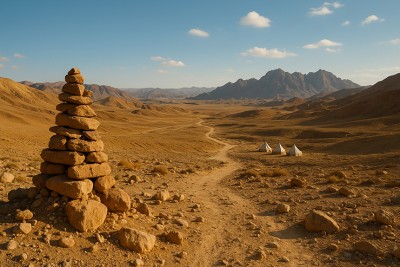
“He made a memorial for His wonders…” — Tehillim 111:4
Parashat Masei, the concluding portion of Sefer Bamidbar, recounts the 42 encampments of the Jewish people during their forty years in the desert. At first glance, the list might seem like a simple travel log. But the Torah is never mere history — it is Torat Chayim, a living guide — and each detail is packed with enduring relevance.
Rashi cites Rabbi Moshe HaDarshan, who explains that this record illustrates G-d’s compassion. Although the extended wandering was a punishment following the sin of the spies, it was not without mercy. Of the 42 encampments, 14 occurred in the first year — before the punishment was decreed — when the Jews eagerly advanced toward Eretz Yisrael. Another 8 were in the final year, on the cusp of entry. That leaves just 20 moves over the remaining 38 years — and for 19 of those, the Jews camped in one place: Kadesh. Far from relentless suffering, G-d granted His people periods of rest and stability.
But the Rambam sees something even deeper. In Moreh Nevuchim, he explains that this detailed itinerary was recorded so future generations would never dismiss the miracles of the wilderness. One might claim that survival was not so difficult — perhaps the Jews camped near fertile lands or springs. To preempt such doubt, the Torah lists each desolate place — places that remain barren to this day. When viewed with our own eyes, we are reminded that an entire nation — young and old alike — survived in the harsh, lifeless desert purely through G-d’s miracles: manna from Heaven, water from the well of Miriam, clouds of glory by day, a pillar of fire by night.
Even now, thousands of years later, the landscape has barely changed. The Sinai Desert remains a testament to Divine providence — a living memorial to our ancestors’ journey and the unfailing care of the Almighty.
The message is clear: our national memory must be rooted in the miraculous. Just as we recall the Exodus each day, so too must we remember how G-d sustained us in the wilderness. The seemingly simple list of stops becomes a map of faith, teaching us that survival is not based solely on logic or resources, but on the unwavering hand of G-d.
May we never forget those forty years of Divine closeness, and may their legacy inspire us as we continue our own journey toward geulah.
Parashat Masei is sponsored by Avraham Zavurov & Frida Yagudayev.
Parashat Masei: Mapping Our Miraculous Journey
Typography
- Smaller Small Medium Big Bigger
- Default Helvetica Segoe Georgia Times
- Reading Mode












